

This therapist directory is offered in partnership with BetterHelp. If you sign up for therapy after clicking through from this site, HelpGuide will earn a commission. This helps us continue our nonprofit mission and continue to be there as a free mental health resource for everyone.
Need to talk to someone now? Find a crisis helpline
If you're a BetterHelp therapist with questions about your directory listing, please contact therapists@betterhelp.com
Looking for the best online therapy services? HelpGuide’s staff surveyed real users and personally tested and reviewed the top platforms to rate them on therapist quality, affordability, privacy and security, user experience, and effectiveness.
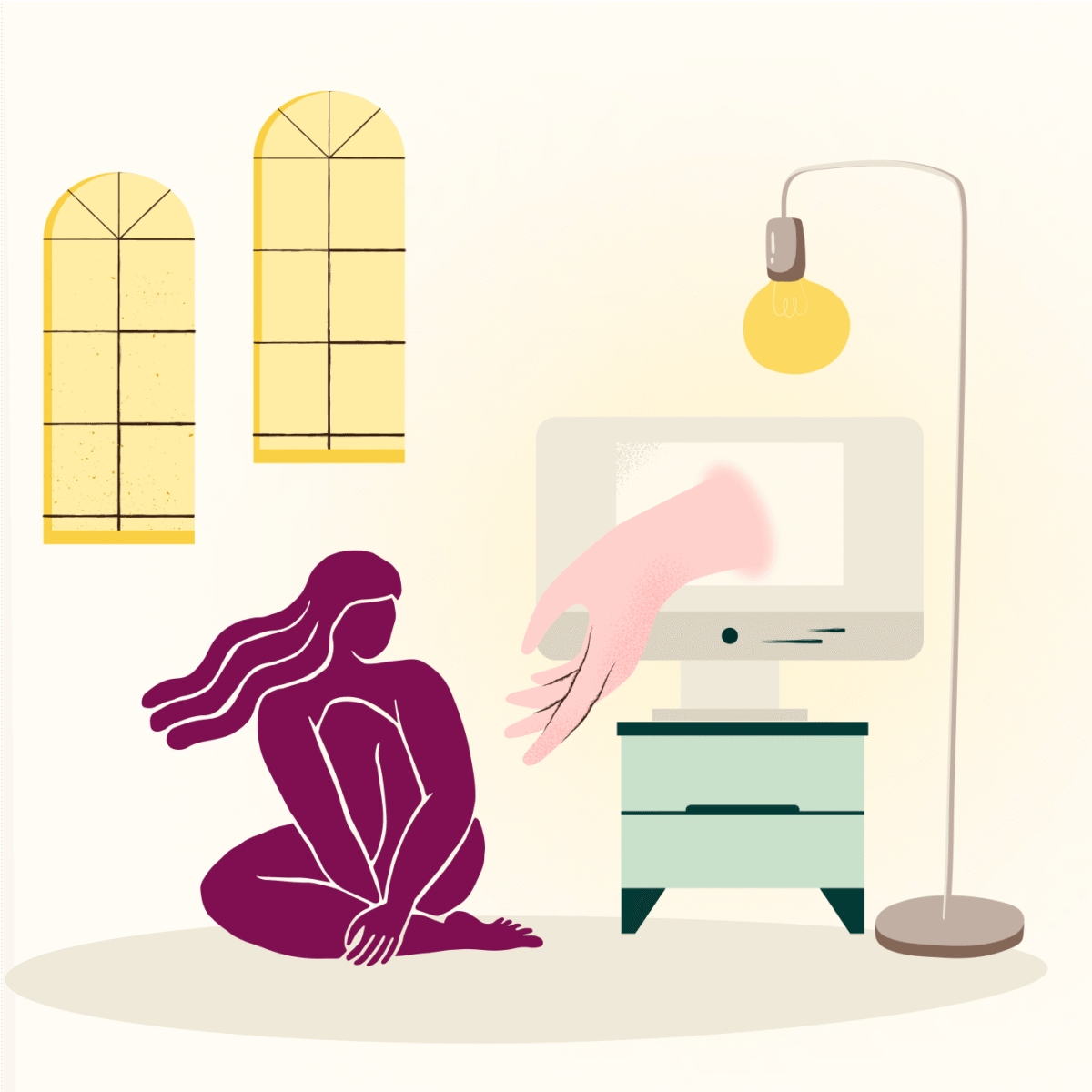
We independently test and review all of the services we recommend. When you sign up through our links, we may earn a commission, which helps support our nonprofit mission. Learn More ›
Online therapy makes it easy to seek mental health care from the comfort of your own home. But as more companies offer therapy online, it can be difficult to know which ones to trust.
To help you find the service that’s right for you, HelpGuide’s editorial team analyzed 87 online therapy platforms. We scored them on 104 data points, including pricing, types of therapy offered, cancellation policies, privacy protections, and therapist diversity and availability. From there, we narrowed the list to 13 platforms that offered the best value and user experience. Finally, we personally tested those 13 platforms and surveyed real users to get their opinions.
We found that BetterHelp, Talkspace, Brightside Health, and Online-Therapy.com were among the best. Our hands-on testers were impressed by each of these platforms, and the platforms also received high praise from the users we surveyed. For instance, among surveyed BetterHelp users, 86 percent said they would use the service again. The other platforms received similar positive feedback.
Here’s a quick breakdown of the top four platforms, their key features, and ratings.
| Platform | Best For | Rating | Key Feature |
|---|---|---|---|
| BetterHelp | Convenience & speed | ⭐4.8/5 | Largest network; usually matches you within 24-48 hours |
| Online-Therapy .com | Self-led tools | ⭐4.7/5 | Includes a complete coping skills course + worksheets alongside live sessions |
| Talkspace | Insurance coverage | ⭐4.6/5 | In-network with major plans (Aetna, Cigna, Optum); offers psychiatry |
| Brightside Health | Medication & crisis care | ⭐4.5/5 | Specialized in anxiety/depression; offers clinically proven crisis care |
Below, we offer overviews of these online therapy networks and explore their pros, cons, and what makes them unique.
Our process started with plenty of research. HelpGuide’s editorial team researched 87 online therapy platforms and surveyed over 1,300 online therapy users. We narrowed the results down to 13 platforms. Finally, we personally tested each one and compared notes. Here’s what we recommend and why.
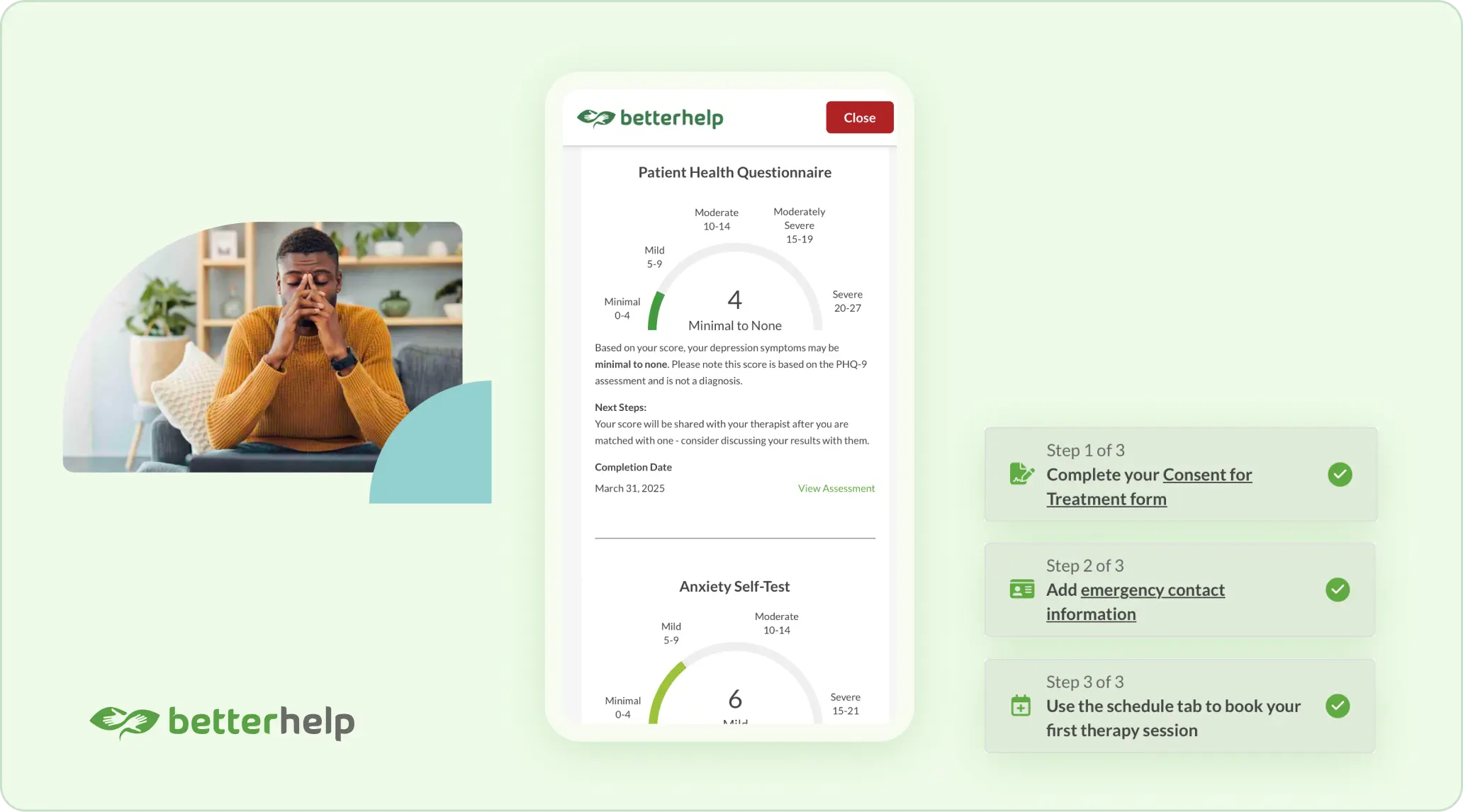
| BetterHelp is most suitable for: | People looking for a broad selection of therapists |
| Starting price: | $65-$100 per week (billed monthly) |
| Insurance accepted? | Yes |
| Financial aid: | Available (25% of users) |
| Therapy types: | Individual, couples, teens |
| Session formats: | Video, audio, text messaging |
| Time to first session with therapist: | 1-2 days |
| Psychiatry services: | No |
Tested by: Sheldon Reid, Staff Writer
Tested by: Chris Saranchock, Director of Operations & Multimedia
BetterHelp is one of the largest online therapy platforms, with more than 30,000 licensed therapists in its network. It covers all 50 states in the U.S. and is also available in many countries internationally, including the UK, Canada, Australia, and India.
One of our team members tested BetterHelp in May 2025 for the purposes of this review. Another staff member tested it in 2023. On both occasions, our staff appreciated not only the wide selection and quality of therapists but also the level of diversity, the thoroughness of the intake questionnaire, the extra features offered on the platform, and the ease of switching between providers.
Betterhelp offers plenty of therapist options and helpful features, such as worksheets, group therapy sessions, and unlimited texting with your provider. However, when we tested the platform in 2025, perhaps the biggest downside was that it didn’t accept insurance. In our survey, financial constraints and lack of insurance coverage were the most common reasons users cancelled the service.
Now, in 2026, some providers on BetterHelp may be in-network with select insurance plans. This is currently limited to 13 states, with expansion planned for later this year.
Even if you’re paying out of pocket, BetterHelp may offer discounts. Our tester was able to reduce the per-session cost from $90 to $72 for the first month of therapy using HelpGuide’s discount code.
Bottom line
Because it’s easy to use and offers extensive options, Betterhelp is a solid starting point for many users. It may not be a perfect fit for everyone though. For example, if you want to use insurance, you might want to try out another therapy platform first.
[Read our full BetterHelp review]
Our total score
Based on expert testing and real user feedback
88/100
We surveyed 100 BetterHelp users across the United States and had two of our in-house staff test BetterHelp. In our survey results we found that the biggest strength was accessibility. Regardless of location, users were able to schedule timely sessions, including during evenings and weekends.
“I was more aware of my emotions, could cope better with things that were stressing me, and I became more confident.”
Survey respondent
“My therapist helped me get through serious anxiety. I wish I could’ve continued, but it became too expensive.”
Survey respondent
Overall satisfaction:
Value for cost:
Empathy rating:
Privacy and security rating:
Platform navigation rating:
“Prior to this, I was skeptical that I’d be a good fit for telehealth therapy. Now I feel much more comfortable with it.”
Sheldon Reid, Staff Writer
“I wish I wasn’t auto-matched with a therapist at the start. I would’ve preferred and expected at least two options. More options appeared when I decided to switch therapists.”
Sheldon Reid, Staff Writer
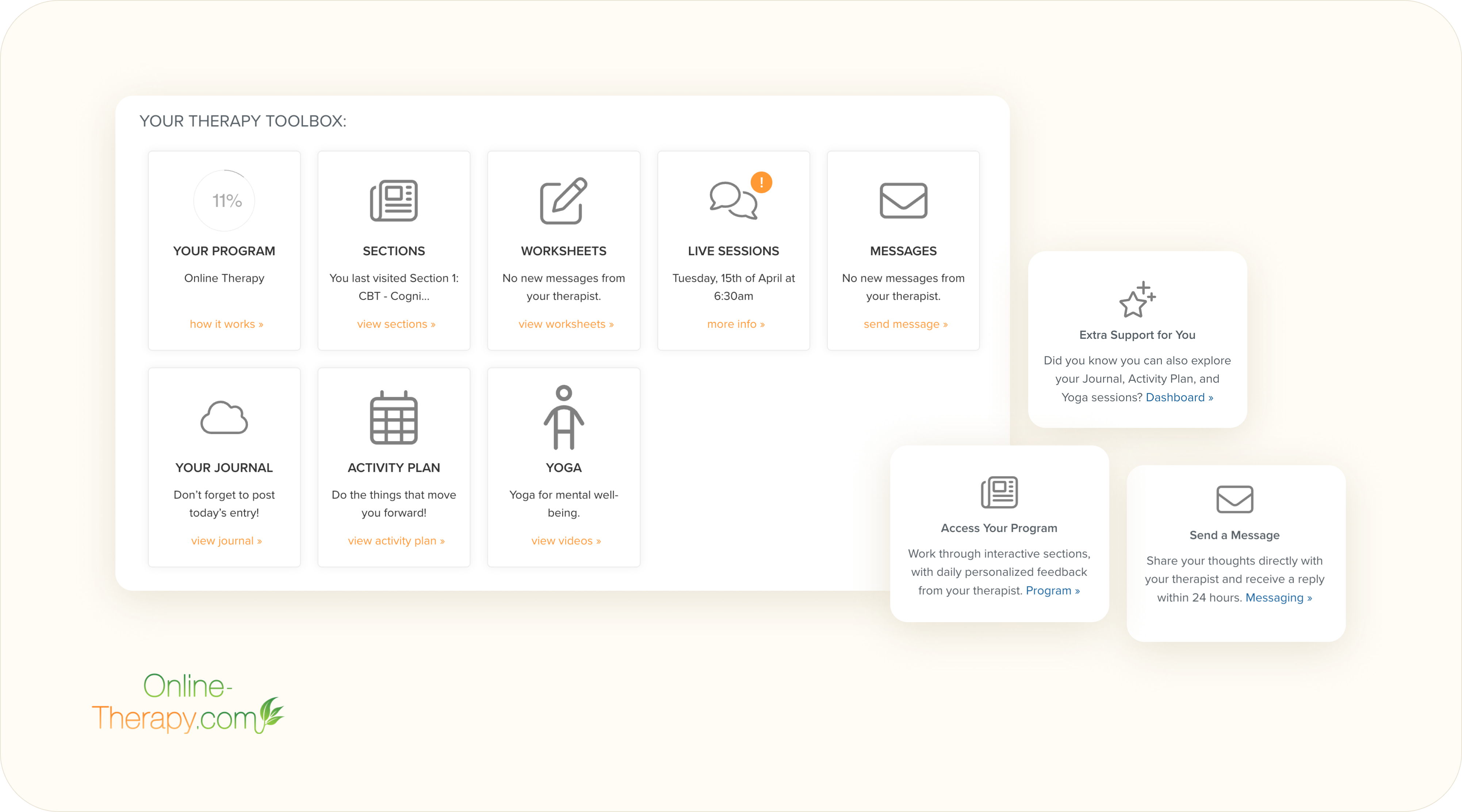
| Online-Therapy.com is most suitable for: | People looking for cognitive-behavioral therapy (CBT) without using insurance |
| Starting price: | $60-$120 per week (billed monthly) |
| Insurance accepted? | No |
| Financial aid: | Available (19% of users) |
| Therapy types: | Individual, couples |
| Session formats: | Video, audio, and text messaging |
| Time to first session with therapist: | 1-3 days |
| Psychiatry services: | No |
Tested by: Chris Saranchock, Director of Operations & Multimedia
Available in all 50 states as well as the UK, Ireland, Australia, and Canada, Online-Therapy.com specializes in cognitive behavioral therapy (CBT), one of the most widely used and tested forms of therapy. All the therapists on this platform are experienced in CBT techniques.
Both our staff member who tested the platform and our May 2025 survey respondents appreciated the quality of Online-Therapy.com’s therapists, as well as the “therapy toolbox,” which offers extra support through worksheets, learning modules, and activity plans, among other features. The platform also has a quick and easy sign-up process. According to our tester, there were 10 questions on the questionnaire, and it took him less than 10 minutes to complete it. 90 percent of survey respondents agreed that it was easy or very easy to get through the sign-up process and intake questionnaire.
Our Online-Therapy.com staff tester for this platform has also used BetterHelp, and in a match-up between the two, he felt that the supporting content was marginally superior on BetterHelp, thanks to their live classes and group therapy sessions. But when it came to the therapist matching process, he gave the edge to Online-Therapy.com.
In the user survey data, financial limitations were cited as the most common reason for stopping therapy on Online-Therapy.com, so not accepting insurance may count against the platform for some users. Its network of providers also isn’t as extensive as some of its competitors. 10 percent of users said they never found a good therapist match.
Bottom line
Online-Therapy.com is best if you’re interested in CBT sessions and prefer a streamlined sign-up process. However, it doesn’t accept insurance, and you might find a wider selection of providers on other platforms.
[Read our full Online-Therapy.com review]
Our total score
Based on expert testing and real user feedback
79/100
We surveyed 100 Online-Therapy.com users across the United States and had one of our in-house staff test Online-Therapy.com. In our survey, users described the platform as reliable, private, effective, flexible, and user-friendly. Both the users and our tester appreciated the quality of therapy and the tools included on the platform, such as worksheets.
“Online-Therapy.com helped me go from stuck to thriving.”
Survey respondent
“My confidence skyrocketed—I felt more in control of my emotions.”
Survey respondent
Overall satisfaction:
Value for cost:
Empathy rating:
Privacy and security rating:
Platform navigation rating:
“I enjoyed my experience with Online-Therapy.com. Worksheets, tools, and yoga were helpful.”
Chris Saranchock, Director of Operations & Multimedia
“I may go back to her as my therapist, and I would have gone back to my BetterHelp therapist at the time as well, so the quality of the therapy was excellent on both platforms.”
Chris Saranchock, Director of Operations & Multimedia
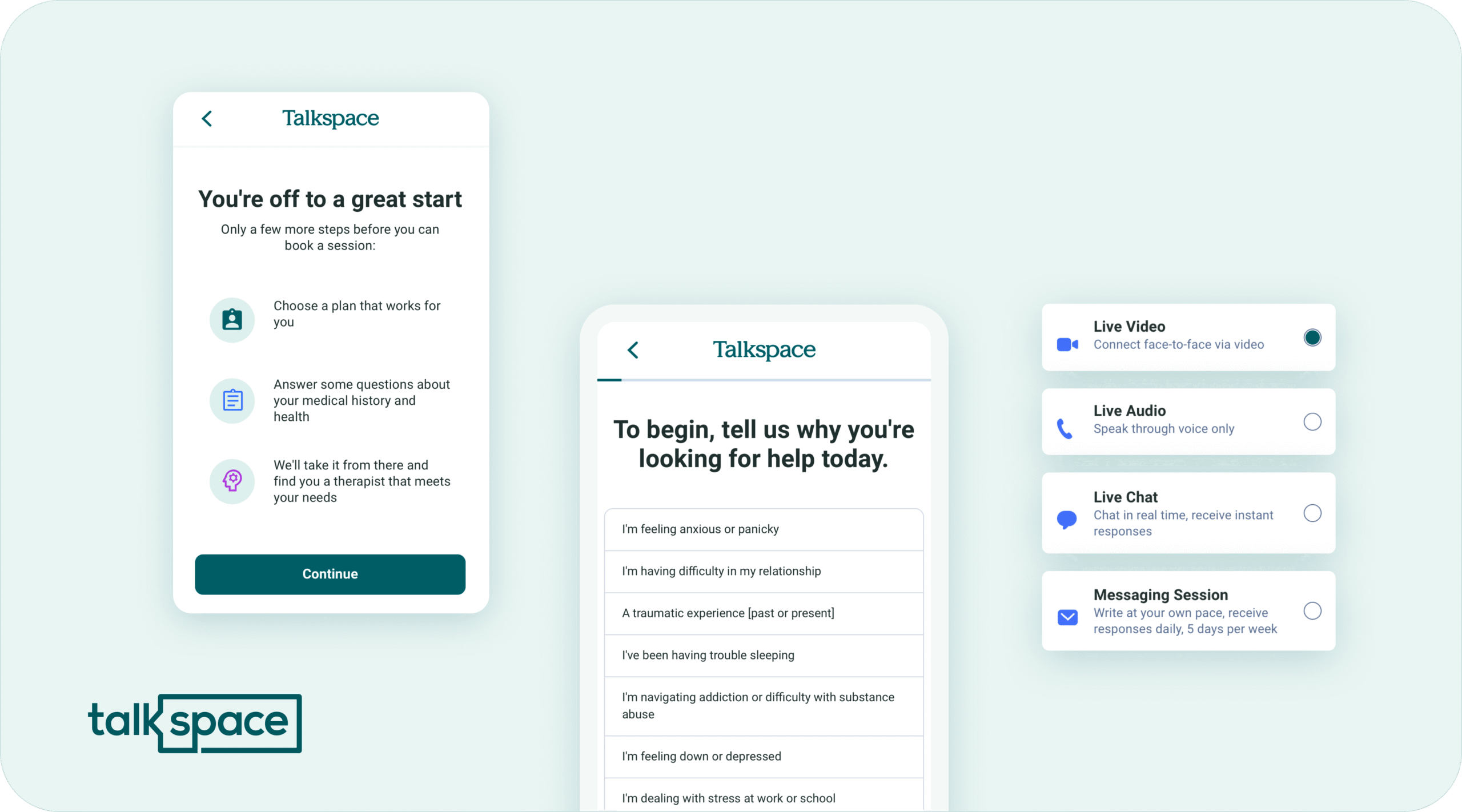
| Talkspace is most suitable for: | People looking for fast insurance approval and therapist matching |
| Starting price: | $69 – $109 per week (billed monthly) without insurance; average copay with insurance $15-30 |
| Insurance accepted? | Yes |
| Financial aid: | No |
| Therapy types: | Individual, teen, couples |
| Session formats: | Video, audio, and text messaging |
| Time to first session with therapist: | 1-3 days |
| Psychiatry services: | Yes |
Tested by: Lawrence Robinson, Managing Editor
Talkspace is one of the more well-known online therapy platforms. It accepts insurance from major providers, including Aetna, Anthem, Cigna, Optum, Regence, TRICARE, and Blue Cross Blue Shield. Depending on your plan, you could pay as little as a $15 copay per online therapy session (25 percent of our survey respondents had a copay of $0).
Our staff tester noted that a major advantage of Talkspace is that it allows you to check your insurance coverage before you create an account. This makes it an excellent option when you’re shopping for online therapy options that match your health benefits. The platform also seems to have an effective therapist-matching system in place. Our staff tester and our survey respondents were overwhelmingly pleased with the first providers they were matched with.
Talkspace does not boast as many providers in its network as BetterHelp. However, unlike BetterHelp, it offers both therapy and psychiatric services. Unfortunately, if you don’t have insurance, the self-pay costs for psychiatry on the platform can be on the high end. In addition, Talkspace doesn’t offer financial aid, and the most common reasons for cancelling were financial, such as insurance running out.
On the Talkspace app, users can access mental health exercises and tools, as well as free live workshops conducted by licensed therapists. Our hands-on tester found the exercises, assessment, and tracking tools to be basic, but felt they may provide some benefit to first-time therapy users. If you conduct your therapy sessions via the Talkspace website rather than the app, you’re likely to overlook a lot of these extra features.
Bottom line
Talkspace is a great place to start if you’re hoping to use insurance to cover the cost of therapy or psychiatry. It’s also useful if you’d rather be matched directly with a provider, rather than click through a directory and select one yourself. If you plan to self-pay or require financial aid, you might want to explore a different option.
[Read our full Talkspace review]
Our total score
Based on expert testing and real user feedback
74/100
We surveyed 100 Talkspace users across the United States and had one of our in-house staff test Talkspace. In our survey results we found that the biggest strengths were insurance coverage and satisfaction with the quality of therapy. Users described the platform as professional, convenient, effective, and life-improving.
“Talkspace made me a better person. I applied what I learned and saw real improvement.”
Survey respondent
“I loved it, but I stopped when I couldn’t afford it anymore.”
Survey respondent
Overall satisfaction:
Value for cost:
Empathy rating:
Privacy and security rating:
Platform navigation rating:
“I could verify if therapy would be covered by insurance before having to create an account, which I really appreciated. And instantly told me what my copay would be ($15).”
Lawrence Robinson, Managing Editor
“Therapist seemed very understanding and empathetic, with a good sense of humor. Provided some interesting insights I hadn’t considered before.”
Lawrence Robinson, Managing Editor
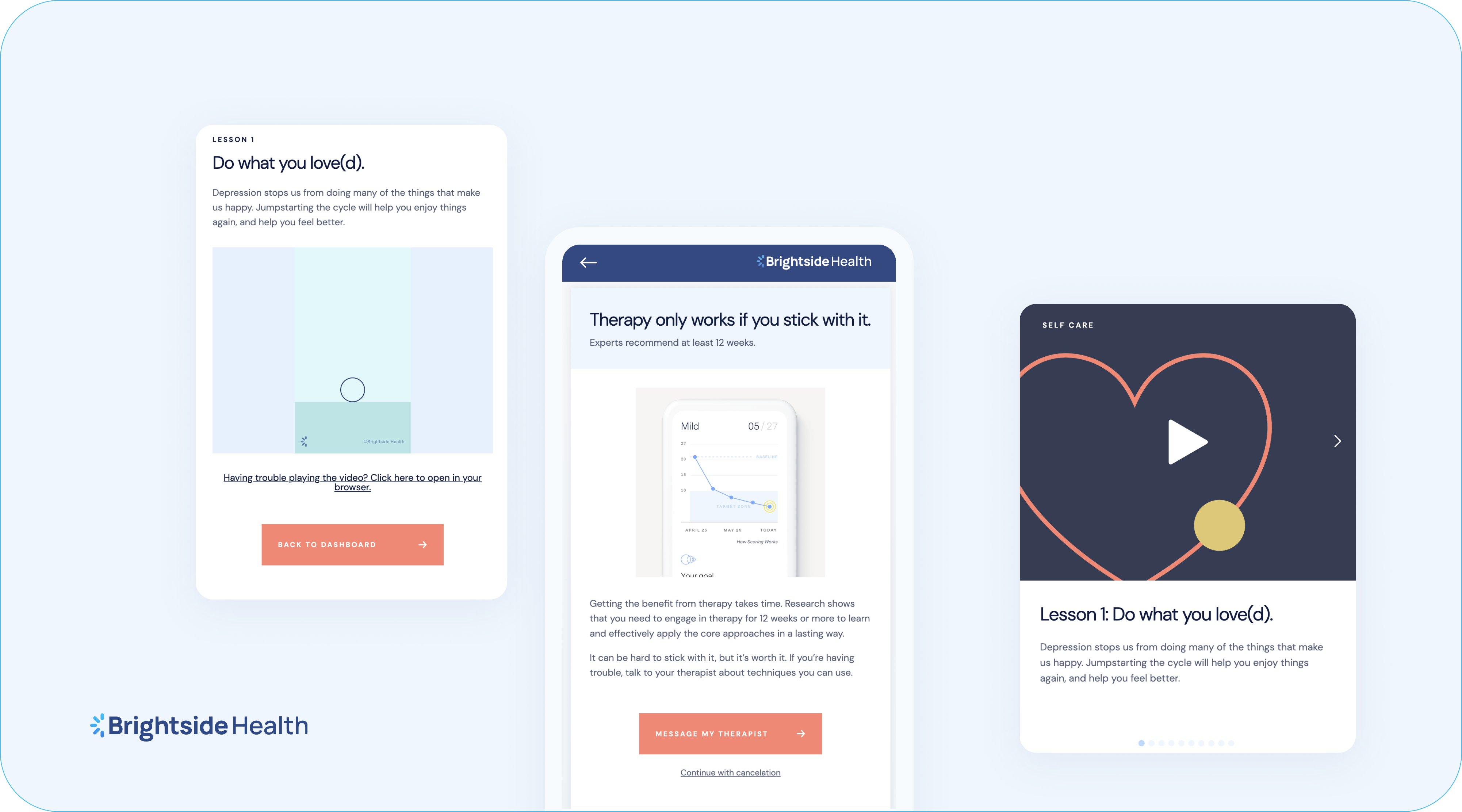
| Brightside Health is most suitable for: | People wanting to use insurance for depression or anxiety treatment |
| Starting price: | $75 per week (billed monthly at $299) |
| Insurance accepted? | Yes |
| Financial aid: | Available (24 percent received) |
| Therapy types: | Individual, teen |
| Session formats: | Video with unlimited messaging between sessions |
| Time to first session with therapist: | 1-2 days |
| Psychiatry services: | Yes |
Tested by: Joseph Collerain, Production Coordinator
Brightside Health specializes in the treatment of depression and anxiety disorders (including panic attacks and social anxiety), along with related conditions, such as bipolar disorder, obsessive-compulsive disorder (OCD), premenstrual dysphoric disorder (PMDD), and insomnia. The platform is available in all 50 states and Washington D.C., but is not currently available in any countries outside the U.S.
Our hands-on testers and our surveyed users reported that Brightside connected them with excellent online therapy and psychiatry professionals. The platform also stood out for its quick appointments, with 68 percent of surveyed Brightside therapy users and 53 percent of Brightside psychiatry users getting a first appointment within three days. Brightside not only accepts insurance but also has affordable self-pay costs, making it very accessible.
Brightside accepts insurance from major carriers, although—unlike Talkspace—you’ll need to create an account before you can see if you’re covered and what your copay will be. And, although the intake assessment was thorough, our tester noted that it might seem overwhelming if you’re already feeling anxious or depressed. Our staff tester was also frustrated to discover that the platform doesn’t offer therapists’ bios until an appointment is booked.
Once matched, though, our staff member described his therapy sessions as a “great experience.” The therapists were caring, empathetic, and responsive. Another benefit to Brightside: even if you don’t have insurance, the self-pay costs are affordable, especially for a platform that offers both therapy and psychiatry services.
Bottom line
Whether you plan to use insurance or not, Brightside Health can be an affordable option with quality providers. However, until you book an appointment, you won’t get to see any provider information aside from their name and qualifications.
[Read our full Brightside Health review]
Our total score
Based on expert testing and real user feedback
81/100
We surveyed 100 Brightside users across the United States and had one of our in-house staff test the platform. In our survey results we found that the biggest strength was value for money, therapy experience, and security ratings. The length of the questionnaire was the primary source of frustration for both our tester and surveyed users, but 81 percent still completed the sign-up in under 20 minutes.
“Brightside helped me reframe my thoughts and take better care of myself.”
Survey respondent
“Brightside changed my perspective on therapy. I felt heard.”
Survey respondent
Overall satisfaction:
Value for cost:
Empathy rating:
Privacy and security rating:
Platform navigation rating:
“Very good experience, the platform was easy to navigate and the therapists were knowledgeable and goal driven.”
Joseph Collerain, Production Coordinator
“Besides some camera glitches with my second therapist, I noticed no problems with the site.”
Joseph Collerain, Production Coordinator
| Platform | Best For | Cost | Insurance | Wait Time | Rating |
|---|---|---|---|---|---|
| BetterHelp | Beginners / Convenience | $65+ | ✅ | 1-2 days | ⭐4.8 |
| Online-Therapy .com | Self-led tools and skill building | $60+ | ❌ | 1-3 days | ⭐4.7 |
| Talkspace | Insurance Users | $69+ | ✅ | 1-3 days | ⭐4.6 |
| Brightside | Focus on anxiety and depression | $75+ | ✅ | 1-2 days | ⭐4.5 |
Some of the other reputable online therapy platforms that HelpGuide staff tested provided mixed results. Depending on your specific circumstances, some may still be worth considering. However, based on our research and analysis, user surveys, and staff testing, we felt the platforms above ranked higher overall.
MD Live is a telehealth platform that offers medical care as well as mental health care (both therapy and psychiatry) across the United States. The platform accepts major insurance plans such as Cigna, Humana, Blue Cross/Blue Shield, and Aetna. Instead of matching you with a therapist, it allows you to choose from a list of providers that fit your preferences.
[Read our full MD Live Review]
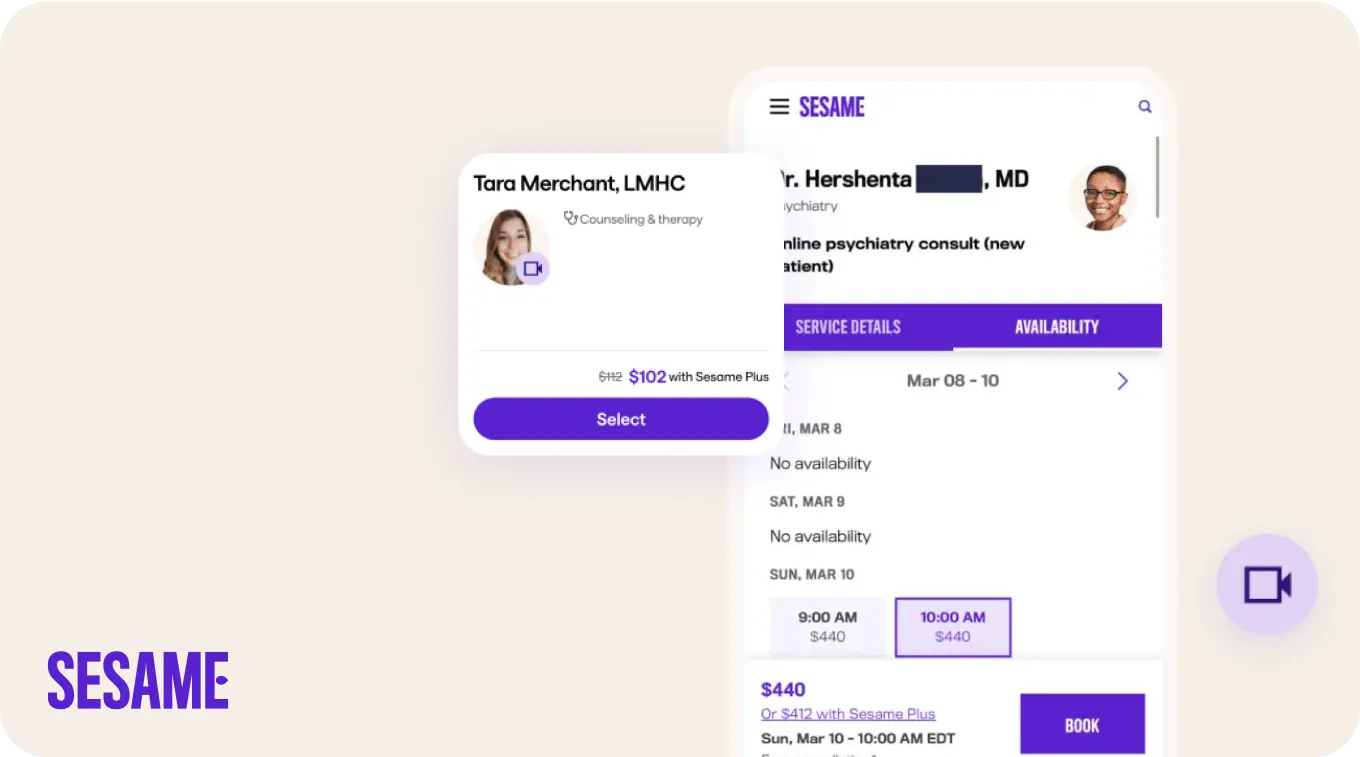
Sesame bills itself as a health care “marketplace” where you can find discounted telehealth appointments with medical providers, including online therapists and psychiatrists. If you don’t have insurance or you have insurance with a high deductible, Sesame could be a good option for finding affordable care. You don’t need a subscription to use Sesame. However, joining the Sesame Plus membership program for $10.99 per month entitles you to a $10 discount for each visit. This may be something to consider if you intend to seek regular therapy through the platform, or use it for other medical services as well, such as primary care consultations.
Amwell is a telehealth platform that allows you to consult with different types of medical providers, including online therapists and online psychiatrists. Our staff tester likened Amwell to a modified directory. You have to sign up for an account before you can browse any providers or see if the service accepts your insurance. Each provider charges their own fees—but these are clearly displayed on their profiles.
In our testing, we found an extremely limited number of available providers. This may have been due to the way in which Amwell operates. If you sign up on Amwell using insurance, you actually will be sent to a branded version of the interface, which focuses on that specific insurance company. However, because our tester opted for self-pay, the provider list may have been very limited.
Thriveworks offers individual, couples, and family therapy in every state of the U.S. except Vermont. In our Best Online Therapy Platforms that Take Insurance recommendations, Thriveworks just missed out as one of our top recommendations. However, if Thriveworks isn’t in-network with your insurance or you’re paying out-of-pocket, it can be expensive.
During testing, we also found that the number of therapists on the platform accepting new clients was very limited. This was reflected in our survey, where 35 percent of Thriveworks users had to wait at least four to six days for an initial appointment.
LiveHealth Online is a telehealth service that offers video visits in all 50 states with medical and mental health care providers, including therapists. LiveHealth is a covered benefit for most Anthem insurance plans, although you have to create an account to confirm that your specific plan is covered. It is also available through some universities and employers, or you can pay out of pocket.
While 62 percent of our survey respondents thought that LiveHealth Online compared favorably with in-person therapy, our staff tester was less convinced. When testing, he found it difficult to schedule appointments. The available therapists had very limited time slots, requiring several weeks between appointments. In the end, other platforms ranked higher for us, but LiveHealth may still be an option to consider if you happen to have Anthem health insurance.
Cerebral offers mental health care across all 50 states, including individual and couples therapy. The subscription-based platform accepts a number of major insurance plans or you can pay out of pocket. Cerebral has faced some controversy in the past for overprescribing controlled medications and sharing the personal information of users with other companies. The platform has resolved both issues with The Federal Trade Commission (FTC).
Our tester felt that finding a quality provider wasn’t a straightforward process. Initially, all his matches were “associates” working under the supervision of a fully-qualified therapist—they’d completed the education part of their license and were gaining clinical experience. Offering therapy from someone not-yet-fully-licensed at a discounted rate could be beneficial for users looking to save money. But the cost was the same for an associate as a fully-licensed therapist.
Another concern arose when our staff member messaged his provider on Cerebral. He received an automated response informing him that his messages were also being viewed by other undisclosed staff at Cerebral, something he was unhappy about.
Doctor on Demand is a telehealth platform that offers both medical and mental health care, including therapy. It accepts many major health insurance plans, but if you’re paying out of pocket, therapy can get expensive: $134 for a 25-minute therapy session or $184 for a 50-minute session. Of the Doctor on Demand users we surveyed in May 2025, only 18 percent elected to pay for therapy without using insurance.
Aside from the high self-pay cost, users also reported some technical issues with Doctor on Demand. 32 percent of our survey respondents experienced technical problems such as difficulty logging in for an appointment or poor video quality during the session.
Our staff tester didn’t experience issues of that sort, but was frustrated by some of Doctor in Demand’s overall practices. While she’d signed up to pay out-of-pocket, without her knowledge or permission the platform contacted her insurance company. This meant that her therapist could see her medical history and medications, something she was very uncomfortable about, especially as the therapist proved not to be a good fit.
For over 25 years, HelpGuide has been a trusted nonprofit helping millions of people each year improve their mental health and wellness. Our mission has always been to empower people with well-researched, accurate information that they can use to strengthen their mental health and well-being—and we bring those same values and principles to our online therapy reviews.
HelpGuide’s editors, writers, and support staff spent 300+ hours conducting user surveys, researching and analyzing 87 online therapy services, and then personally testing platforms for at least one month each.
Data research and comparative analysis
Our analysis began by researching 87 reputable online therapy platforms (as well as numerous directories). Among other factors, our team analyzed pricing models, cancellation policies, platform certifications, types of therapy offered, and privacy and security measures to help identify which services offer the best value and safest user experience. We weighted each feature, totaled up the scores, and then hand-tested the highest rated.
User surveys
Since HelpGuide staff members are based in just three different U.S. states, we wanted to broaden our net to gauge the opinions of users from all across the country. So, in addition to our hands-on testing, we also conducted extensive surveys with over 1,300 real online therapy users to measure factors such as satisfaction, therapist responsiveness, value for money, and platform usability.
Professional feedback
To validate our testing methodology, we consulted with licensed therapists, psychologists, and psychiatrists, including members of our Professional Advisory Council. These mental health professionals reviewed our evaluation criteria and helped us refine how we scored platforms for therapist quality, care structure, and ethical standards. Their input ensured our rankings reflect what truly matters in a therapeutic setting, like emotional safety, professional integrity, and clinical effectiveness.
Hands-on testing
After narrowing down all the platforms we researched to 13 options that met our scoring qualifications, HelpGuide staff members used each platform for a minimum of four weeks as regular users, without disclosing who we worked for or what our aims were. During our testing, we each kept a weekly journal recording our experiences and completed detailed questionnaires so we could accurately compare and contrast the different platforms. At the end of testing, we matched notes and shared experiences to help inform our choices for the best online therapy platforms.


Therapist quality and matching accuracy

Pricing and value for money

Session types and communication options

Ease of use and platform navigation

Insurance coverage and payment options

Privacy and security

Customer service experience
Read our full testing methodology.
In the end, all our research, user surveys, and hands-on testing led us to conclude that BetterHelp was the best online therapy platform. Its large network of providers increases your chances of finding the right therapist. In addition, its intuitive interface and extra features make it an excellent option whether you’re new to online therapy or are already familiar with telehealth services. Finally, it’s an affordable option, especially when you weigh in all the extra features.
Still, you might find that other platforms better meet your specific needs. So, don’t hesitate to explore the other options we’ve covered here if you think there’s a better fit for you.
There are many different options when it comes to online therapy platforms. Some will automatically match you with a therapist who meets your criteria, others will offer you a list of therapists to choose from. Some restrict you in how you can connect with a therapist, others offer you a choice of messaging, phone, and live video. Some platforms are very basic but easy to use, while others offer a host of extra features to supplement your therapy sessions.
When choosing an online therapy platform, you may want to consider factors such as:
Therapist selection. Ultimately, finding the right therapist for you is the most important consideration. Without the right connection between you, therapy is unlikely to be very successful. Do you want a therapist who shares your cultural background or sexual orientation, for example, or one who speaks a language other than English? Some platforms match you with a therapist based on your selection criteria, while others let you choose from a filterable list. Since it often takes some trial and error to find a good fit, it’s important that a service allows you to easily switch therapists until you find the one that’s right for you.
Affordability. Trying to find an online therapy service that fits your budget can be tough. Using a therapy service that takes your insurance often means you’re only charged for a copay, depending on your plan. If you choose a platform with a subscription, paying up-front for longer can often bring the total cost down. Some platforms offer financial assistance, while private therapists sometimes charge for their services on a sliding scale, so you pay based on your income. You can also take advantage of any coupon codes or introductory offers to help lower costs.
Privacy. In the United States, the Health Information and Portability Accountability Act (HIPAA) means that legally what you tell your therapist is private and confidential—unless you’re deemed a danger to yourself or others. However, you also want to make sure that connecting with a therapist is also done on a secure platform. Checking a service’s privacy policy will let you know the level of privacy measures and data protection they offer.
How quickly you can get started. When you’re struggling with a mental health issue, you likely want to start therapy as soon as possible. Many popular online therapy services promise to match you with a therapist within a few days and schedule your first appointment within a week or so. Of course, where you’re located, the availability of suitable therapists, and your stated preferences mean matching could be much faster—or slower.
Extra features. Some online therapy platforms offer extra features in addition to therapy sessions. These may include group therapy sessions, webinars, video tutorials, relaxation exercises, and tools to track your progress or mood. Others enable you to message with your therapist between sessions with any questions or concerns, or offer check-ins to monitor your well-being. Consider which functions are likely to be most useful for you.
Ease of use. One drawback to online therapy can be technical issues that sometimes arise, interrupting the therapy experience. Take a moment to browse an online therapy platform or app to test its functionality and make sure it’s easy for you to use.
Crisis response. Some platforms ensure that your therapist knows the exact address where you’re having your online therapy session, so they can summon help if you’re in crisis and the connection’s lost. Others simply include a link on the platform that connects you to a crisis helpline. When relaying crisis protocols, there can often be inconsistencies from therapist to therapist on the same platform. When considering an online therapy platform, it can be reassuring to check how they handle crisis situations.
Finding the right therapist for you often takes some time and trial and error. You’re looking for someone you can trust, someone you feel comfortable opening up to and talking honestly about your innermost thoughts and feelings. You also want to feel safe, heard, and understood by your therapist.
You may be fortunate and find the right connection with the first therapist you try. Or you may have to shop around and change therapists a few times to find one that’s a good fit. When choosing an online therapist, you may want to consider:
Licensing. Online platforms should be vetting their therapists, but it’s still a good idea to make sure the therapist holds a current license and is in good standing with your state’s regulatory board. You can do this by searching on Google for your state, therapist type, and clinical license (for example: “Florida LMFT license verification,” or “California psychologist license verification”). When looking up your therapist’s license, you will also be able to see if any complaints have been made against the therapist.
Experience and specialty. Look for a therapist who is experienced in treating the issues or challenges that you’re dealing with. Therapists often have areas they specialize in, such as anxiety, ADHD, or relationship counseling. When they’ve experienced dealing with specific problems over and over, a therapist may be able to offer you more insight and a broader range of coping tips.
How well you gel. When you look at their online profile, a therapist may seem like the perfect fit, but you can never be certain until you meet them. If the connection doesn’t feel right, you don’t feel comfortable opening up to them, or you don’t feel they understand or care about your problems, it’s fine to search again. One of the advantages of online therapy is that it’s often easier to switch therapists. On many platforms, it merely takes a few clicks.
We asked over 1,300 users of online therapy platforms about their experiences and how online therapy compared to traditional in-person therapy. Here’s what they told us:
64%
of respondents said online therapy was equally effective as in-person therapy.
21%
said online therapy was more effective than their previous in-person experiences.
15%
reported that in-person therapy was more effective for them.
“My therapist online was more consistent and engaged than the one I saw in person for two years. I felt more comfortable opening up from home.”
Survey respondent
Among users who preferred in-person therapy, common reasons included:
| Online Therapy | In-Person Therapy | |
|---|---|---|
| Accessibility | 24/7 access | Limited hours |
| Average cost | Out of pocket: $60-200+ Insurance copay: $0-50 depending on plan, deductible, etc. | Out of pocket: $100-200+ Insurance copay: $0-50 depending on plan, deductible, etc. |
| Effectiveness | 64% rated it as effective as in-person therapy, according to our survey results | 15% rated it more effective than online therapy |
| Top benefit | Convenience and flexibility | Greater sense of personal connection |
| Largest drawback | Can feel detached or less personal sometimes | Less convenient |
Online therapy platforms aren’t your only option for finding a therapist. If you have insurance, you can check with your insurance company to find a therapist in-network. You can also get recommendations for private practice therapists from friends or your primary care doctor.
If you don’t have insurance or are struggling to afford therapy, you may still have some options:
You can also find online services and directories that cater exclusively to certain groups. For example:

National Queer & Trans Therapists of Color Network provides mental health practitioners with a focus on the queer and trans people of color (QTPoC) community.

Therapy for Black Girls offers resources for women of color.

Therapy for Black Men offers a directory of therapists catering to Black men and boys.
We’d love to hear from you! Your feedback helps us improve and make sure you’re finding the support and information you need.
Millions of readers rely on HelpGuide.org for free, evidence-based resources to understand and navigate mental health challenges. Please donate today to help us save, support, and change lives.
Donate to HelpGuide.org today